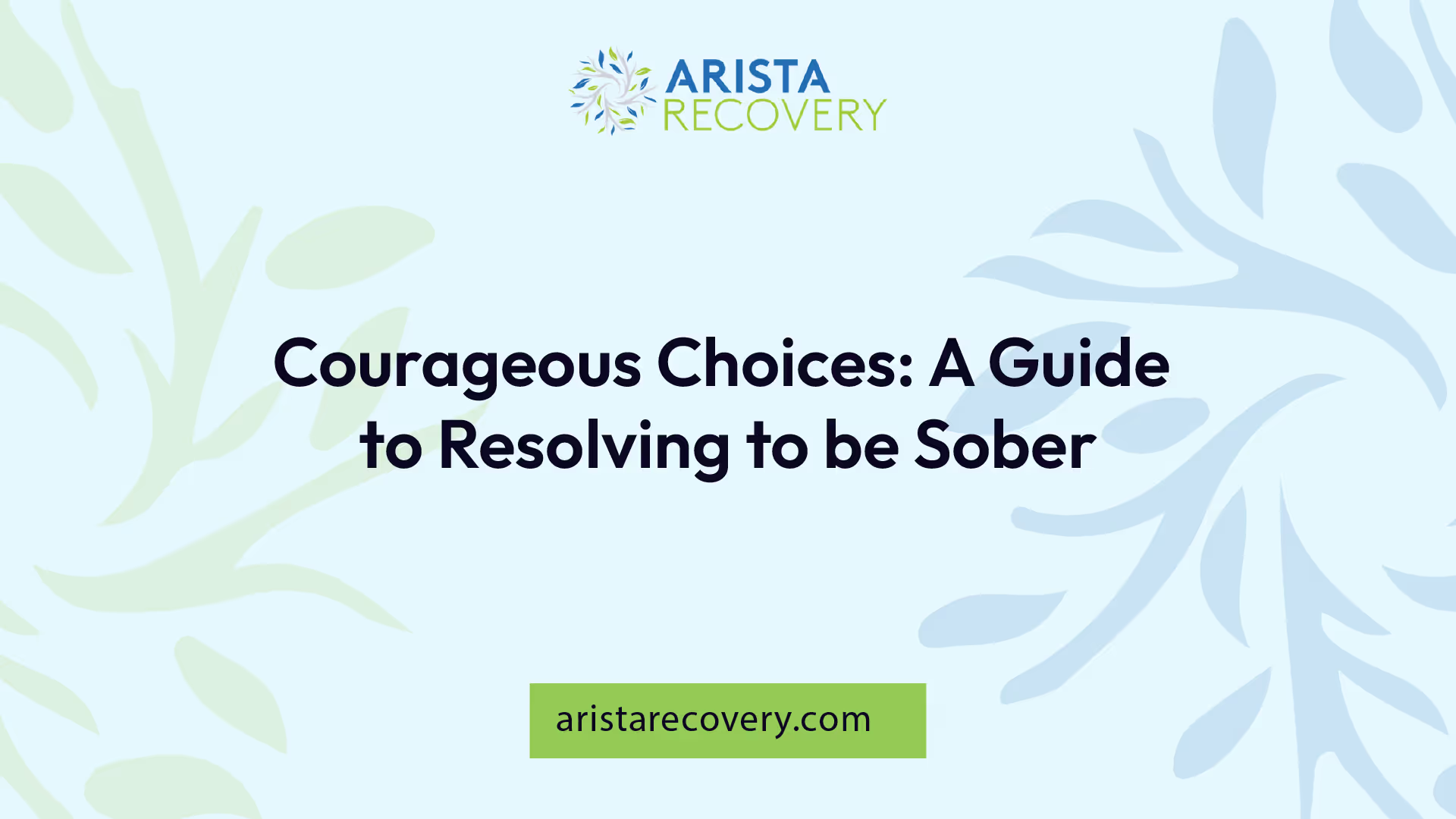A Guide to Resolving to be Sober

Understanding Sobriety
Definition and History
Sobriety refers to the state of being free from the influence of intoxicating substances such as alcohol or drugs. Historically, the concept of sobriety has evolved significantly, influenced by cultural, societal, and health perspectives. The push for sober living often rises from the destructive effects of addiction on personal relationships and individual well-being. As noted, many individuals choose to seek sobriety after realizing the harm addiction causes to themselves and their loved ones.

Benefits of Sobriety
Choosing to be sober offers numerous benefits across various aspects of life, including physical health, mental well-being, social interactions, and financial stability. Below is a summarized table of the notable benefits that come with resolving to be sober:
BenefitDescriptionImproved Physical HealthSubstance abuse can lead to numerous health issues, such as liver damage, heart problems, and respiratory issues. Sobriety allows the body to heal and recover from these ailments. (Insight Recovery Centers)Enhanced Emotional StabilityBeing sober contributes to more stable emotions. This stability is crucial for achieving a greater sense of inner peace and contentment [2].Stronger Social RelationshipsIndividuals in recovery often work to rebuild relationships impacted by their addictive behaviors. Sobriety allows for repairing damaged connections and rebuilding trust. (Sober Recovery)Financial StabilitySobriety can lead to decreased spending on addictive substances, allowing individuals to better manage their finances and save for future needs.
The journey to sobriety can be challenging but is often accompanied by significant rewards that enhance an individual's quality of life. Emphasizing both personal health and the restoration of relationships, choosing to become sober is a monumental step toward a more fulfilling and constructive lifestyle.
Physical Health Impacts
Sobriety brings significant changes to an individual's physical health. It reduces health risks associated with substance abuse and aids in recovery from existing health conditions.
Reduction of Health Risks
Choosing sobriety leads to a decrease in the risk of health problems commonly associated with alcohol and substance abuse. Research indicates that abstaining from these substances can lessen the likelihood of developing conditions such as liver disease, heart disease, and high blood pressure. Alcohol consumption is also linked to a higher risk of certain cancers; therefore, limiting or quitting alcohol can lower these risks.
Health RiskDescriptionLiver DiseaseReduces the chances of liver damage and related illnesses.Heart DiseaseLowers the risk of cardiovascular issues and high blood pressure.CancerDecreases the risk of developing alcohol-related cancers.
Recovery from Health Conditions
Sobriety facilitates the healing process for individuals who have experienced health issues due to substance use. The body begins to recover as the effects of alcohol diminish. Once the severe symptoms of alcohol withdrawal are managed, individuals can notice improvements in both physical and mental well-being. This healing process applies to various organ systems, including the brain, liver, heart, and gastrointestinal tract [4].
Moreover, alcohol can deplete essential nutrients and interfere with metabolic processes. By stopping alcohol consumption, the body can reclaim its nutritional balance. This can prevent the excessive caloric intake associated with binge drinking, where an individual may consume an additional 600 calories in one sitting [4].
Recovery AspectBenefitsBrain FunctionImproved cognitive abilities and mental clarity.Liver HealthGradual healing of liver damage and improved function.Heart HealthEnhanced cardiovascular function and reduced risk of heart disease.Nutrient AbsorptionBetter nutrient uptake and overall metabolic health.
Resolving to be sober can immensely improve one's physical health, allowing for a more vibrant and healthier lifestyle.
Mental and Emotional Well-being
Sobriety is a transformative journey that greatly impacts mental and emotional health. This section explores how resolving to be sober leads to a decrease in mental health risks and promotes emotional stability and growth.
Decrease in Mental Health Risks
Choosing sobriety markedly reduces the risk of developing mental health issues. Many individuals who struggle with addiction also face challenges like depression, anxiety, and irritability. In particular, post-acute withdrawal syndrome (PAWS) can manifest with symptoms such as depression, irritability, anxiety, difficulty sleeping, and exhaustion. These symptoms can persist for six months to two years after ceasing alcohol use [5].
Data indicates that up to 80% of people who achieve long-term sobriety may experience at least one relapse. Recovery is often a non-linear process, marked by setbacks. Recognizing mental health symptoms and seeking help is crucial for successful recovery.
Emotional Stability and Growth
Sobriety also fosters emotional stability and personal growth. It cultivates a new state of mind, leading to a kinder and gentler demeanor. Individuals often find that this newfound clarity allows them to explore new interests, develop passions, and pursue meaningful goals with greater energy and motivation.
Many people who achieve sobriety describe a sense of purpose, fulfilling long-held aspirations and feeling accomplished. By resolving to be sober, they equip themselves with the ability to engage with life's challenges and joys in a more balanced and constructive manner.
AspectEffect of SobrietyMental Health RisksReduction of risks associated with addictionEmotional StabilityIncreased stability, less irritability and anxietyPersonal GrowthExploration of new interests and fulfilling goals
The journey towards sobriety is not just about avoiding substance use; it encompasses a comprehensive improvement in mental and emotional well-being, leading to a more fulfilling life overall.
Social Relationships
Social connections play a significant role in the journey of recovery. Sobriety not only helps individuals mend relationships that were strained by substance abuse but also creates opportunities for building new, healthier connections based on trust and respect.
Repairing Damaged Connections
Addiction often causes significant strain on relationships. Friends and family may feel hurt, betrayed, or frustrated due to the behaviors associated with substance abuse. However, as individuals commit to resolving to be sober, they can begin to repair these damaged connections. Sobriety fosters the development of meaningful interactions with loved ones, making it easier to reconnect after a period of struggle.
Impact on RelationshipsBenefits of SobrietyStrain from addictionImproved communicationLoss of trustRebuilding trust graduallyEmotional distanceGreater emotional availabilityConflicts and misunderstandingsEnhanced empathy and understanding
As Samaritan Inns highlights, sobriety can not only repair these relationships but also foster new bonds based on mutual respect and understanding. This process often involves open communication and a willingness to address past hurts.
Building Trust and Respect
Restoring trust and respect is a gradual process. Friends and family members need time to see consistent positive behavior, which reinforces the commitment to sobriety. Building a strong support network is crucial. Friends and family who understand the journey and encourage sober living can provide the necessary emotional backing.
Additionally, joining support groups like Alcoholics Anonymous (AA) or SMART Recovery can enhance recovery efforts. These groups offer individuals the chance to meet others facing similar challenges, creating an environment of understanding and accountability. According to Family Addiction Specialist, such networks are invaluable for maintaining sobriety and building trust.
The transition from addiction to sobriety is not only about personal improvement but also entails nurturing and rebuilding social relationships. The benefits of resolving to be sober extend beyond the individual, positively impacting those around them, leading to healthier, more supportive interactions.
Career and Financial Advantages
Sobriety offers significant benefits related to one's career and financial standing. Resolving to be sober can lead to improvements in work performance and financial stability.
Improved Work Performance
Achieving sobriety often results in enhanced job performance. Individuals who are sober typically experience decreased absenteeism and better overall reliability in their work environments. Substance abuse can severely impact productivity and lead to job loss; however, once an individual commits to sobriety, they may find themselves more focused and motivated at work.
Work Performance FactorsImpact with SobrietyAttendanceImproved attendance ratesFocusIncreased concentration and productivityReliabilityEnhanced dependability on the job
Fear of losing one's job or damaging relationships at work often serves as powerful motivators for seeking help. The realization of disappointing colleagues can prompt an individual to reevaluate their choices and prioritize their career [1].
Financial Stability
Sobriety can also lead to significant financial improvement. Individuals who prioritize sobriety often begin to allocate their resources more wisely, focusing on essential expenses instead of substance use. As a result, they may find themselves enjoying a more stable financial situation.
Financial FactorsImpact of SobrietySpending HabitsReduced spending on substance useBudgetingImproved ability to manage expenses like rent and billsSavingsPotential for greater savings due to decreased frivolous expenditures
Overall, getting sober helps individuals rebuild their careers and improve their financial health. By overcoming addiction, they can make better choices that support both their professional and personal lives, leading to long-term benefits in various aspects of their existence.
Strategies for Long-Term Sobriety
Achieving and maintaining sobriety is a journey that requires ongoing effort and support. Individuals can enhance their chances of long-term success by implementing effective strategies that focus on self-awareness and professional assistance.
Identifying Triggers
Understanding internal and external triggers is essential for preventing relapse. Triggers are situations, emotions, or specific people that can evoke thoughts or desires related to alcohol use. By recognizing these triggers, individuals can develop strategies to manage or avoid them effectively.
Trigger TypeExamplesEmotionalStress, sadness, anxietySituationalSocial gatherings, parties, certain locationsEnvironmentalSmell of alcohol, specific times of the day
Developing coping mechanisms tailored to these identified triggers is crucial. For instance, if certain social settings are identified as triggers, individuals may choose to avoid those situations or engage in alternative activities that do not involve alcohol. Seeking guidance from an alcohol specialist can also assist in recognizing triggers and crafting necessary coping skills [7].
Seeking Professional Support
Support is a vital component in the journey to sobriety. Building a strong network of friends and family who understand the commitment to sobriety can provide essential encouragement. Additionally, joining support groups such as Alcoholics Anonymous (AA) or SMART Recovery can significantly aid individuals in maintaining their sobriety by connecting with others who share similar experiences [7].
Professional support may also include counseling or therapy sessions where individuals can explore their experiences and feelings related to alcohol use. Research indicates that while some physical damage from alcohol can heal over time, the mental aspect may require more extended support [4].
Recognizing symptoms of Post-Acute Withdrawal Syndrome (PAWS), which can last from six months to two years after quitting alcohol, is crucial. Symptoms may include depression, irritability, anxiety, difficulty sleeping, and exhaustion. Seeking help for these symptoms is imperative for successful recovery [5].
By integrating strategies for identifying triggers and actively seeking professional support, individuals can foster a sustainable path to sobriety and enrich their lives free from alcohol dependence.
When mental health challenges and addiction intersect, it can feel isolating. At Arista, we offer compassionate, evidence-based, and trauma-informed care to help you heal, grow, and move forward.
You’re not alone in this.
When mental health challenges and addiction intersect, it can feel isolating. At Arista, we offer compassionate, evidence-based, and trauma-informed care to help you heal, grow, and move forward.
Support that moves with you.
You’ve taken a brave first step. At Arista Recovery, we’re here to help you continue with best-in-class care designed for long-term healing and support.
.webp)






